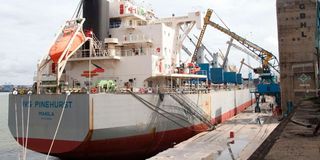No, imports can’t stabilise prices

A ship at the port of Mombasa carrying imported maize. The government should go back to the drawing board and conduct a proper assessment of likely negative consequences of the erosion of the tax base, the risk of contamination of balance sheets of ‘government approved banks’, and the consequences of flooding the market with cheap imports.
The chairman of the Presidential Council of Economic Advisers, Dr David Ndii, texted me the other day to challenge me on an aspect of a story I penned recently about the decision by the new administration to make state-owned Kenya National Trading Corporation (KNTC) to import hundred thousand tons of household goods on a duty-free basis.
That story quoted a letter by Secretary to the Cabinet Mercy Wanjau showing the Cabinet had given KNTC the approval to ‘borrow from a government approved bank’ Sh15 billion in trading lines of credit and Sh5 billion for fertiliser stocks.
Dr Ndii’s contention was that my story had missed a key aspect of what had been passed, namely, that KNTC will be trading these duty-free imports on consignment. He said and I quote:‘ You have this wrong. KNTC is trading on consignment, not on its P and L. Similarly, the Sh15 billion is trade finance i.e. issuance of letters of credit –not loans’.
In a sense, he was right because there was no mention in my story about ‘a sale on consignment arrangement or ‘trade finance’. Still, Dr Ndii’s response raised more questions than answers. Is it really possible to have a working consignment arrangement that shields KNTC’s from liability and exposure when the truth is that in most of the transactions, KNTC is the importer on record - the party required to open LC facilities in ‘government-approved banks’ for the imports?
Yes, it is trade finance and not a loan as Dr Ndii says. But the exporter of cooking oil in Malaysia must be fully paid by the time the goods get here. The LC costs incurred by ‘the government approved bank’ and paid through its correspondent bank in New York constitute a loan to KNTC- the importer on whose instructions ‘the government approved bank’ is acting when it opens the LC’s.
We all know that when a bank issues a letter of credit of Sh15 billion, it is an exposure and contingent liability that can crystallise into a loan. We also know that the Central Bank of Kenya’s single borrower limit guidelines applies to LC’s too. In the current circumstances, and with the crippling dollar shortages we are facing- any prudent bank will be wary to open such huge LC’s because these facilities oblige you to fork out the dollars to pay the suppliers when the LC’s mature.
Non-performing loans
Prudently run banks have internal and discretion protocols that stipulate limits on the issuance of LC’s. In short, a bank issuing Sh15 billion in LCs on an account of an entity like KNTC with a near-zero balance sheet has taken huge risks. Have we forgotten how similar state-backed arrangements with government-controlled banks with the National Oil Corporation ended in massive non-performing loans? Very similar arrangements for the National Cereal and Produce Board ended in huge non-performing loans that still linger in the books of the Kenya Commercial Bank.
Who said that because it is a consignment arrangement, KNTC is shielded from liability and exposure? Under its business model, Nakumatt deemed stocks on its supermarket shelves as third-party stocks held on consignment. That the model only recognised the stuff on the shelves as stock purchases at the point of sale. To date, suppliers and creditors are still chasing the directors in court.
In the Triton scandal case, the legal ownership of the oil in question belonged to international traders and creditors under the so-called collateral financing agreement between the trading companies, Kenya Pipeline and the Kenya Commercial Bank. The structure of the transactions very much resembled consignment sales. When the shit hit the fan, KPC- the ‘consignee’- was hit with multiple claims by ‘consignors’.
Clearly, this idea of allowing massive imports to stabilise domestic prices was not well thought out. The government should go back to the drawing board and conduct a proper assessment of likely negative consequences of the erosion of the tax base, the risk of contamination of balance sheets of ‘government approved banks’, and the consequences of flooding the market with cheap imports.
The option of negotiating revolving credit lines with Afri Exim Bank being touted as an option by the Ministry of Trade and Industry is fraught with risks. Granted, regional lenders are a good recourse as they are among the only lenders left to deal with sovereigns facing severe dollar liquidity crises like ours.
Perhaps we should all read the ‘Loan Wolves’ debt scam report by the investigative group, the ‘Sentry’ to appreciate just how revolving credit lines extended by regional lenders are prone to corruption risks. On Monday, Reuters reported that Kenya has sought to defer fuel payments to ease foreign exchange pressure and that suppliers were being asked to accept 180 days' credit.
We don't have the dollars to pay for 900,00 MT of maize, 750,000 MT of rice, 300, MT of sugar, 150,000 MT of cooking oil and 80,000MT of beans.
Period.





